Chips in the Membrane- A Cyberpunk 2077 Narrative Review
Do you like your RPG game experience ruined by a long-winded discussion with a bunch of plot spoilers? Then you’ve come to the right place! Let’s get buuuusyyy!
Cyberpunk 2077 appeared on the video game scene like a fart in an elevator. The audience piled up the rotten tomatoes on CD PROJEKT RED (of Witcher games fame), and the game was flogged pretty good in social media. I think that I’m one of the few who didn’t mind the game when it first came out. Then again, I didn’t play long enough to come across any nasty glitches. I put it aside and decided to pick it up once some of the bugs had been worked out. I recently began playing it again and recorded a bit of game play.
From a narrative perspective, this game is as dense as Christmas fruitcake. Every little slice is packed with plot goodness. I have to admit, I don’t like too much dialog when playing video games. I just want to get on with the smacking and the blowing. Cyberpunk 2077 has a lot of diolog, half the game is sitting around talking. You can easily get lost in a morass of ideas and technical jargon. Being a cyberpunk fan, I’m already familiar with the concepts of the genre, so I take it all for granted. I easily forget just how philosophically intoxicating these themes can be. This post is an attempt to sit back, mull those themes over, and consider the narrative experience in a more thoughtful manner.
We often eat the fruit and throw away the seeds. Discard them as if they’re nothing important. Yet, the seed contains the most important part of the fruit- its genetic blueprint for future development. It’s the same with art, and science fiction in particular. We’re often dazzled by the colors, the flashes, and the creamy protuberances, then we carelessly discard the seed message and its implication for our own future development. In all the hand-wringing surrounding the game's near-Hindenburgean release, we ignored the importance of its themes. A shame really. After all, there is a reason why these ideas are enduring and are being told once again.
Back in the 80s, William Gibson published his breakthrough novel, Neuromancer. In this novel, Gibson introduced the concept of cyberspace, and the idea that in the future, we’ll be able to neurally hook ourselves to this "consensual hallucination" via computer consoles. Consciousness would not be limited to the meat body but could extend across cybernetic networks. Talk about consciousness expansion! Since then, this theme has been explored in various novels (Snow Crash), games (Deus Ex), and movies (the Matrix). It is an enduring viral idea that is also a key element of the Cyberpunk 2077 narrative.
For those who are not familiar with Cyberpunk 2077, it’s a video game in which the player assumes the role of V. You can play the game from the perspective of different characters- as a street-smart hustler, a corporate dude, or a nomad. You choose your background at the beginning of the game. I chose to play as a streetkid because this one seemed the most interesting to me.
Massive Spoilers incoming in 3, 2, 1…
I’m not going to get into all the details of the plot because I want to focus on the themes as described in this particular scene. In the game, characters are able to connect neurally to computer networks and interact with engrams, backup copies or constructs of an individual’s consciousness. Our hero protagonist, V, is neurally equipped to interface with engrams and during one of his jobs, the engram of a terrorist rock star, Johnny Silverhand, is inserted into his brain. V, the protagonist, actually gets murdered, but because of the chip in his brain, he comes back to life. The only downside to this astonishing turn of events is that the engram of Johnny Silverhand became active and began interacting with V's neural system. Did I mention that Johnny Silverhand is played by none other than Keanu Reeves of Matrix fame? That’s right. In this game, you’re stuck with Keanu Reeves inside your head.
As an aside, this is one of Keanu’s best performances. It’s not necessarily his acting skills that are compelling, but the strong sense of immersion you derive from the interaction, and the feeling that you and Keanu do indeed share a special bond. I get a chuckle every time he shows up and starts with his smart-ass quips. It’s rather unfortunate that not many people will get to interact with the actor in this manner. It’s really a superb experience.
In the scene shown in the video, the protagonist, V, is already aware that Silverhand is inside his mind, and that the chip in his brain is going to kill him in due time, unless he finds help. Those who have read Gibson’s Neuromancer will find this story line familiar. In Neuromancer, the anti-hero, Case, is implanted with sacs that contain a neurotoxin that will dissolve in his nervous system unless he completes a job on time. The job has to do with the memories and thought-patterns of some famous hacker. Sound familiar?
In Cyberpunk 2077, V has captured Hellman, a neuro-engineer who is familiar with the chip inside V’s head. V has taken Hellman to a motel, where he interrogates him about what he knows regarding the chip now lodged in V’s neural network. In this scene, Hellman conducts a quick examination of V’s chip and proceeds to tell him the bad news.
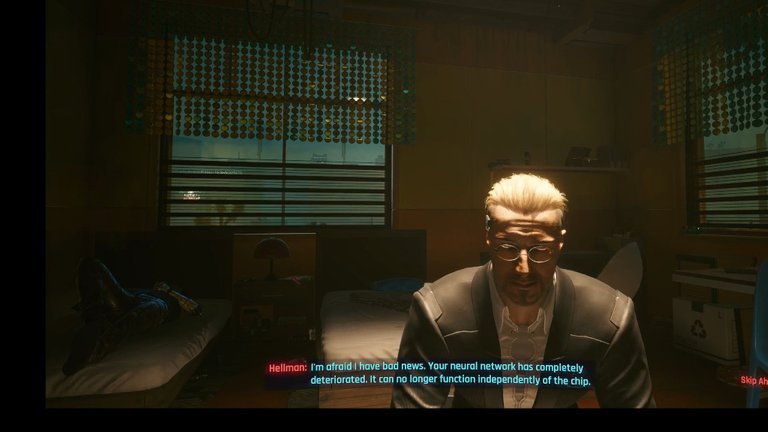
Silverhand’s graphical avatar is supposed to be only visible to V because Silverhand (Keanu) is just a neural engram, the thought-patterns of the long dead rebel. From time to time, his image flickers to remind us of Silverhand’s “virtual” construction. While this flickering effect seems futuristic, it is actually anachronistic. After all, we’re dealing with a neural, not a digital construct. The flickering effect has been derived from the visual noise of old fashioned tapes and early era computer glitches. We can only imagine what neural glitches will actually look like if we ever get that far.
So Hellman tells V the real bad news: the chip has become embedded in his neural network. Terrible. This is the part that makes us squeamish about the idea of computer chips in the brain. It’s one thing to replace a hip or even a heart, which can be removed if necessary, but it's quite another when you embed something that literally becomes a part of you. Unfortunately, there just doesn’t appear to be any other way. The artificial and the neural must interface somehow. If we’re going to cybernetically merge with computational devices- and everything seems to be pointing that way- then we need to get synaptic.
The Cyberpunk genre has become so saturated that we take this idea of chip-in-the-brain for granted. We forget how ontologically and metaphysically shocking the notion is. Let’s put it in context. It has taken evolutionary processes billions of years to develop the human neural network with all its intricate computational complexities. Now we’re getting close to a time when we will be able to accelerate neural evolution by manufacturing components artificially, giving us the ability to enhance and create new forms of consciousness within an astonishing short amount of time.

Ah yes, there's always Sweden. Which reminds me, what’s up with Sweden?


“It’s programmed to take over its new environment. At all costs.”
Clutches pearls and faints.
Take a deep breath, relax, and read that line a few more times.
I assume there will be people in positions of power who will abuse this chip technology. That is a given. We all know the usual suspects. I used to think that something like this wouldn’t happen in the western world because we’re all freedom loving individuals and would never let it happen. Seeing the state of the world nowadays, I’m sure it will happen. What better way to control what people say and do than by giving total neural control to a bunch of bureaucrats in the politburo. When that day comes, the natural response to this will be horror and recoil at the possibility of government mandated brain chips. It will inevitably turn many against the technology. They may even fight against it, but it will be futile. This is why I’m in agreement with Elon Musk; we either put the chip in ourselves or someone else will do it for us.

We used to talk about multiple personality disorder (now dissociative identity disorder) with the understanding that this was a disruption in one’s mental functioning. We did not and still do not believe that there are two or more separate personalities within a person who suffers this condition. An engram, as conceptualized in the game, is a different ball of wax because the engram contains the neural patterns of a real separate personality. So you're not just imagining things, you do have multiple personalities within you.


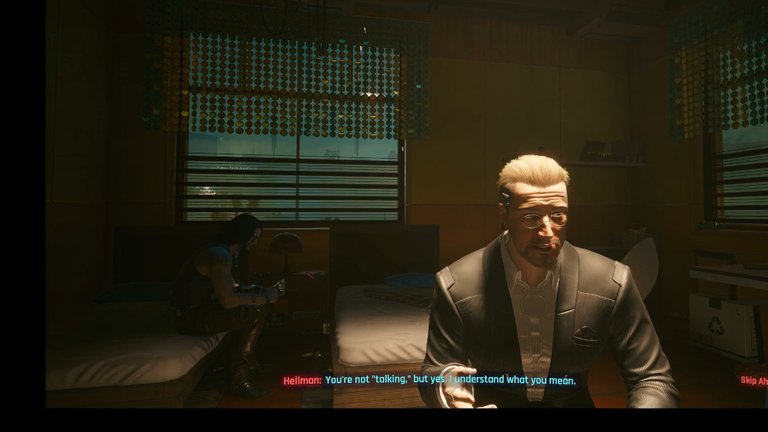
This is thoughtful and clever writing. Through this piece of dialog, the writers are letting us know that our subjective experience of Johnny, as a graphical entity we can interact with, is not real, it only seems real to us. At the neural level something else is happening, which to some extent is outside our control. This is the kind of nuance you can miss if you’re not keen on sitting through extensive dialog scenes, of which this game has plenty.
Imagine having a chip embedded in your brain that will slowly merge with your neural apparatus and eventually take over. The change will be inevitable and perhaps irreversible. What could be the consequences of such a drastic alteration?
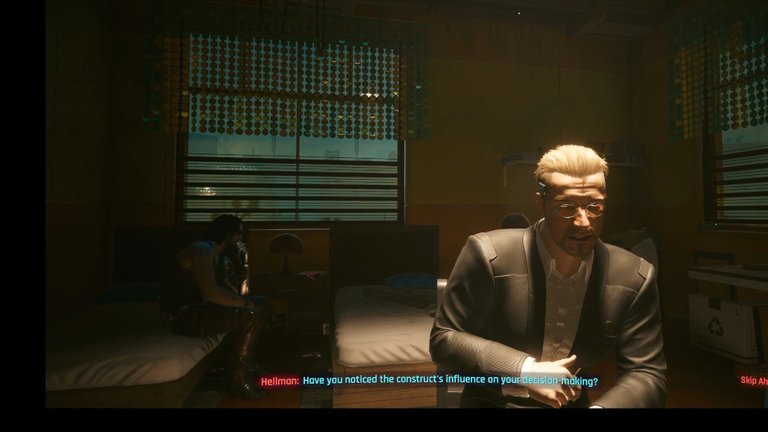
The engram has the capacity to take over the host’s personality to the point of influencing his or her behavior. This is exhilaratingly thrilling and spooky at the same time. I can see the positive and the negative in this system. Imagine someone who’s paralyzed and requires a neural patch to regain mobility. Just get a chip. Imagine someone who’s shy and would prefer to be more outgoing. Just get a chip. Maybe someone has an unhealthy fear of spiders. Nothing that a chip in the brain couldn't fix. Perhaps they would like to be a better lover. Chip it good, chip it real good. Or maybe someone doesn’t want to get vaccinated. Wait what?
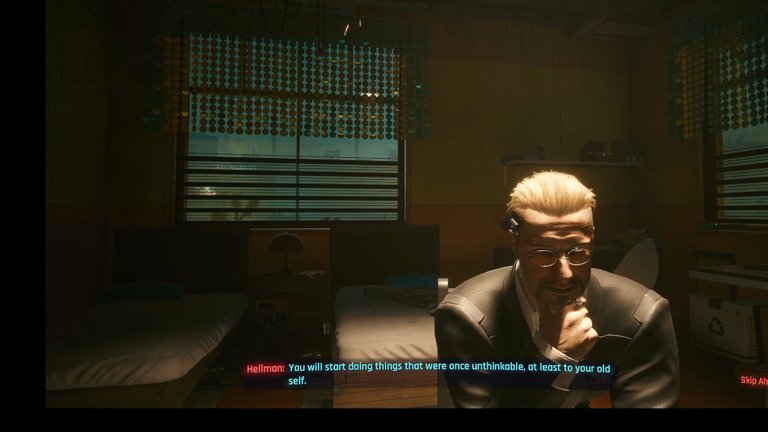
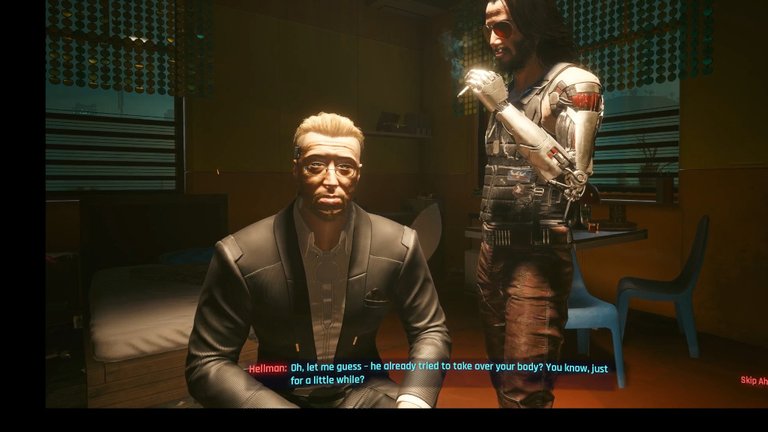
Hellman is just trying to mess with V’s head, but he’s got a good point. At what point in the process, does your old self disappear, and the self (or selves) embedded in the chip take over? Would it be a seamless transition or an abrupt dissociation from your old self. This is mind-boggling to think about, as anyone who’s had experience with ego dissolution can tell you. As a society, it’s a conversation we’ll need to have sooner or later.
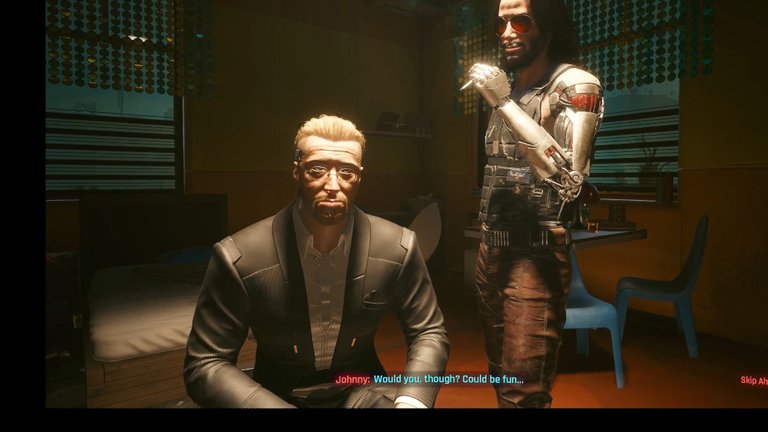
This is what makes Keanu’s performance in this game exceptional. The wry sense of humor and just plain bad-assness of his character. The tension of the conversation is broken by his mischievous lowbrow wit. At the end of the day, when trying to look into the near or far future, the titanic shift looming over the horizon, you gotta keep that sense of humor. Be like Keanu. And if you’re not the type of person who enjoys his type of humor, then have I got the perfect engram for you!
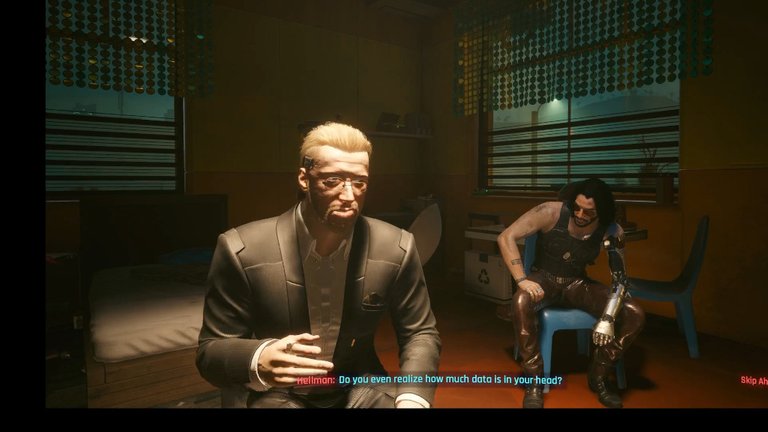
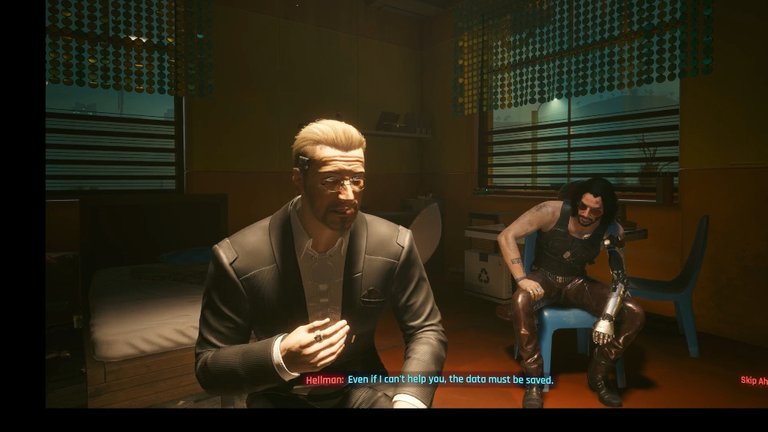
This type of dialogue makes Cyberpunk 2077 a great, though not spectacular, game from a narrative standpoint. In some ways, I feel like this story has been told already, and we’ve tread down this path before. The theme of our intimate relationship with artificial electronics is enduring and central to the cyberpunk mythos, but it is perhaps our cultural statement that this type of chip-in-the-brain future is inevitable and just around the corner. We won’t have to be dragged to that future kicking and screaming because it will wash over us like a tsunami. Some of us will go along, some of us will fight against it, and some of us will let the chips fall where they may.
Video and screenshots by @litguru
▶️ 3Speak